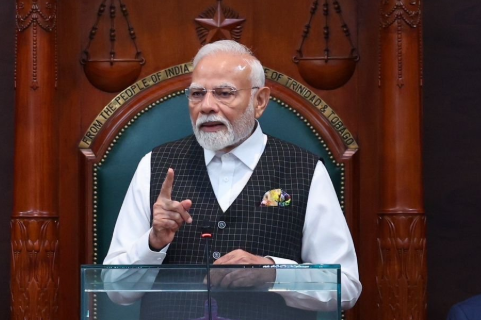
In a significant development shaking the global trade and geopolitical landscape, U.S. President Donald Trump has imposed a steep 25% tariff on Indian imports. The tariffs, announced in retaliation to India’s deepening trade ties with Russia and continued oil purchases from Moscow, are being viewed as part of Trump’s increasingly aggressive foreign policy stance in his second term.
But what followed next was a fiery and unequivocal response from Indian Prime Minister Narendra Modi, who made it clear that India will not compromise the interests of its farmers, fishermen, or livestock rearers at any cost, regardless of the international pressure.
Speaking at the M.S. Swaminathan Centenary International Conference, PM Modi delivered one of his strongest statements yet against global economic coercion. In a speech broadcast across the nation and watched closely by the international community, he declared that protecting Indian farmers and the agricultural economy is his government’s top priority.
“The interest of our farmers is our highest priority,” Modi declared. “India will never enter into any agreement with any country that harms our farmers, fishermen, or livestock keepers. I am personally prepared to pay a very high price for this, and I know what that means—but I am ready.”
The Prime Minister's remarks came just hours after Trump’s announcement, indicating a well-coordinated response from India’s top leadership. According to the U.S. President, the additional 25% tariffs are not just aimed at Indian exports, but are also meant to penalize India for increasing oil imports from Russia and strengthening bilateral ties with the Kremlin. This policy, critics argue, is part of Trump’s broader economic weaponization strategy as tensions between the West and the Russia-China bloc continue to escalate.
But PM Modi's firm stance suggests that India is unwilling to play by the rules dictated from Washington. With elections approaching in both countries and the global order in flux, this confrontation could mark a major turning point in India-U.S. relations.
Addressing the gathering, PM Modi emphasized that agriculture is not just an economic sector in India, but the backbone of the nation. The livelihoods of millions of Indian citizens—farmers, cattle rearers, and fishermen—are intrinsically tied to it, and no external pressure will be allowed to compromise their future.
India, he said, is fully prepared to deal with any consequences arising from this economic move by the U.S. government. “We are ready,” he repeated multiple times throughout his address, reflecting both resolve and defiance.
The Prime Minister’s statement sent a powerful message—not just to the U.S., but to the entire global community—that India will stand up for its domestic interests and sovereign decision-making, even if it comes at a cost.
This development is being watched closely by analysts, who believe it could lead to a rethinking of India’s trade strategies going forward. With the world becoming increasingly polarized between Western-led blocs and alternative alliances, India seems to be signaling a shift toward greater strategic autonomy.
Trump’s announcement of the tariffs and Modi’s strong rebuttal come amid already strained ties between the two countries on multiple fronts, including defense procurement, oil trade, and diplomatic alignments. Yet, India’s assertiveness under PM Modi highlights a new phase in foreign policy—one where national interest takes precedence over transactional diplomacy.
As of now, the ball is back in Washington’s court. Whether the U.S. administration chooses to escalate or negotiate remains to be seen. What is clear, however, is that India has drawn a red line—and it will not cross it.




